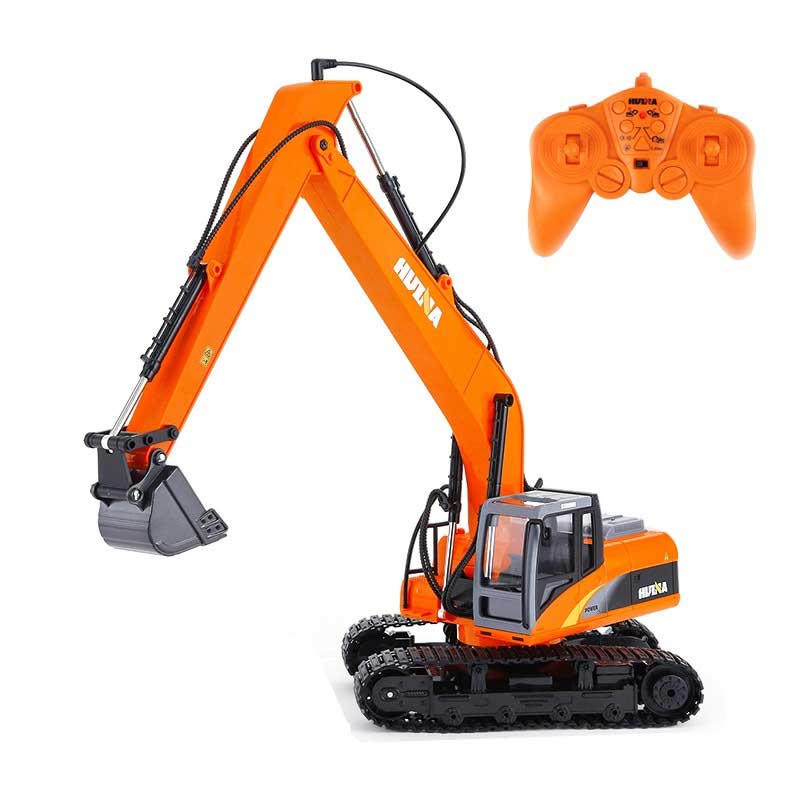Discover the Value of Excavator in Modern Construction Projects
Excavators are necessary tools in contemporary building tasks. Their flexibility permits them to perform a vast array of tasks, from excavating and grading to demolition and website preparation. Advanced attributes, such as hydraulic accessories and general practitioners, enhance their capabilities and effectiveness on work websites. As the industry advances, the significance of excavators grows a lot more. Understanding their role can expose insights into the future of building practices. What exists in advance for these equipments?
The Versatility of Excavators in Various Projects
Although excavators are often connected with massive building projects, their flexibility permits them to be utilized in a wide variety of applications, from domestic landscape design to energy upkeep. In metropolitan setups, excavators can navigate tight spaces to dig structures for homes or install water drainage systems. Their capability to execute fragile jobs makes them perfect for landscape design tasks, where they can dig deep into for ponds or plant trees. Additionally, excavators play a crucial duty in energy upkeep, efficiently excavating trenches for pipes or wires without disrupting bordering areas. In farming applications, they assist in land clearing up and soil prep work. Their flexibility enables them to be outfitted with different attachments, boosting their functionality throughout various tasks. This diverse nature of excavators not only enhances various building and construction procedures yet likewise demonstrates their indispensable role in modern facilities growth and maintenance.
Key Features and Sorts Of Excavators
The discussion on vital attributes and sorts of excavators highlights the essential qualities that make these machines vital in building. Various excavator types, each created for certain tasks, demonstrate their convenience and efficiency throughout various applications. rc excavator. Understanding these features and classifications is vital for optimizing their usage in modern-day building projects
Excavator Enters Review
Excavators play a critical role in contemporary building and construction, offering flexibility and performance across different jobs. These hefty machinery systems can be found in several types, each tailored for specific applications. One of the most usual kinds consist of crawler excavators, understood for their security on irregular surface, and wheeled excavators, which supply higher flexibility on smooth surface areas. Miniature excavators are favored for small projects and tight spaces, while long-reach excavators are developed for deep digging. Furthermore, there are specific excavators, such as hydraulic excavators, which boost power and accuracy. Each kind includes distinct abilities, making them crucial for tasks varying from digging and grading to demolition and material handling. Recognizing these variants enables building and construction experts to select the right excavator for their project needs.
Trick Features Explained
Comprehending the essential attributes of excavators enhances their effective application in building projects. Excavators are identified by their powerful hydraulic systems, which offer the necessary pressure for excavating, training, and moving products. Their articulated arms enable for a broad array of activity, assisting in precise operations in restricted spaces. Additionally, the selection of add-ons, such as pails, grapples, and augers, increases their convenience to satisfy various job requirements. The dimension and weight of excavators also add to their stability and maneuverability on numerous terrains. Developments in innovation have led to the integration of General practitioner and automation, improving precision and effectiveness in excavation tasks. These features jointly place excavators as essential devices in modern-day construction.
Applications in Construction
Transforming construction sites, excavators play a crucial duty across different applications, varying from property building projects to massive infrastructure growths. These versatile devices are geared up for jobs such as excavating foundations, trenching for utilities, and site grading. Different types of excavators, including crawler, rolled, and mini excavators, give details benefits tailored to the job needs. Crawler excavators master rough surfaces, while rolled excavators use movement on paved surfaces. Small excavators are excellent for confined spaces, making them prominent in urban setups. The efficiency and power of excavators considerably quicken building and construction processes, ensuring prompt task completion. Their flexibility additionally boosts their value, allowing building and construction teams to tackle a diverse selection of challenges properly.
Enhancing Efficiency and Efficiency on Work Sites
Taking full advantage of efficiency and performance on task sites is an essential objective in modern-day construction. Excavators play a critical role in attaining this goal by improving numerous tasks. Their capability to execute multiple features-- such as digging, training, and grading-- decreases the demand for added tools, consequently saving time and resources.Moreover, excavators improve process by enabling faster completion of tasks. With innovative functions like hydraulic accessories and general practitioners technology, they can implement precise operations that reduce mistakes and rework. This precision not just boosts the quality of job however likewise maximizes product usage, contributing to set you back savings.The versatility of excavators permits them to adapt to different site conditions, guaranteeing our website that jobs progress efficiently despite obstacles. By integrating excavators right into building procedures, groups can considerably enhance their general productivity, causing prompt job completion and boosted productivity.
Security Benefits of Making Use Of Excavators
Excavators substantially boost safety and security on building and construction websites with improved operator exposure and decreased hands-on labor dangers. By supplying operators with a clear view of their environments, excavators help to avoid injuries and accidents. Additionally, the machinery lessens the requirement for employees to involve in unsafe hand-operated jobs, even more promoting a more secure work atmosphere.
Boosted Driver Exposure
Building and construction sites can be chaotic and filled up with potential risks, boosted driver visibility plays a necessary function in guaranteeing safety and security when making use of excavators. Modern excavators are designed with large, unblocked home windows and purposefully put mirrors, enabling drivers to keep a clear view of their surroundings (rc excavator). This enhanced visibility is important for identifying pedestrians, other machinery, and different barriers, substantially lowering the danger of accidents. Furthermore, lots of excavators incorporate sophisticated innovation, such as electronic cameras and sensors, you can find out more to provide drivers with added point of views, further improving understanding. The capability to see more clearly not only aids in effective operation yet additionally cultivates a safer workplace, making it simpler for operators to navigate intricate construction websites without endangering safety requirements
Reduced Manual Work Dangers
When hand-operated labor is minimized with the use of excavators, numerous safety benefits emerge, substantially enhancing the well-being of building and construction workers. Excavators decrease the physical pressure associated with hefty lifting and repeated tasks, efficiently lowering the danger of bone and joint injuries. By automating procedures such as digging, grading, and relocating materials, they permit employees to keep a safer range from prospective dangers. Furthermore, excavators are geared up with sophisticated security functions, such as rollover security systems and enhanced driver ergonomics, which better protect personnel on website. The result is a substantial reduction in office crashes and injuries, leading to boosted productivity and spirits amongst construction groups. Eventually, the adoption of excavators adds to a more secure and a lot more reliable construction environment.
Excavators in Earthmoving and Site Prep Work
In modern building and construction, a considerable part of earthmoving and site preparation jobs relies on the performance and adaptability of excavators. These machines are made to take care of numerous soil types and surface, making them essential for rating, digging, and trenching activities. Their hydraulic arms can be geared up with different attachments, such as containers and augers, permitting operators to personalize their technique based on particular task requirements.Excavators excel at moving large quantities of earth promptly and effectively, which speeds up the overall building and construction timeline. They can navigate tight areas and challenging websites where conventional tools might battle, improving efficiency. In addition, the precision of excavators guarantees that website preparation follows stringent specifications, decreasing the threat of errors that can lead to costly rework.
The Duty of Excavators in Demolition Tasks
Excavators play a vital function in demolition jobs, as they possess the power and agility needed to dismantle frameworks successfully. Equipped with different add-ons such as hydraulic breakers, shears, and grapples, these devices can adjust to different demolition demands, whether Read Full Report for tiny buildings or big industrial websites. Their adaptability allows drivers to take on complex jobs while keeping security and precision.In enhancement to their demolition capacities, excavators help with debris removal, guaranteeing that work websites stay orderly and secure. By breaking down structures right into convenient items, they enable structured clearing up and recycling of materials, lining up with modern-day sustainability efforts.Moreover, excavators can access tight rooms and browse uneven surface, making them vital in metropolitan demolition tasks. Overall, their robust design and multifunctionality make excavators a vital possession in the demolition stage of building and construction, adding significantly to job timelines and effectiveness.


Future Fads in Excavator Technology and Usage
As the building and construction market progresses, improvements in excavator innovation are positioned to change their use and effectiveness noticeably. One considerable trend is the integration of automation and fabricated intelligence, enabling excavators to run with very little human intervention. This change will improve accuracy in tasks such as grading and trenching, reducing human mistake and boosting productivity.Additionally, the rise of electrical and hybrid excavators is forming a much more lasting building and construction setting, reducing carbon exhausts and fuel prices. Improved telematics systems are also emerging, allowing real-time tracking of maker efficiency and upkeep needs, which can bring about much better operational efficiency and longer tools lifespan.Moreover, developments in add-on technology are expanding the versatility of excavators, enabling them to perform a more comprehensive variety of jobs. The combination of these patterns demonstrates a future where excavators are smarter, greener, and much more adaptable, inevitably improving building project characteristics.
Often Asked Concerns
How Do Excavators Compare to Other Building And Construction Equipment?
Excavators, identified by their versatility and power, master excavating and earthmoving compared to various other machinery. Their capacity to do various jobs, consisting of lifting and demolition, makes them crucial in construction projects, boosting general performance.

What Is the Average Life-span of an Excavator?
The average life-span of an excavator normally varies from 7,000 to 10,000 operating hours, depending on upkeep, use conditions, and model. Appropriate treatment can expand this life-span, guaranteeing peak performance throughout its operational years.
Exactly How Are Excavators Preserved for Ideal Efficiency?
Excavators need regular maintenance for peak performance, including routine assessments, liquid checks, filter substitutes, and timely repair work. Carrying out a preventative upkeep timetable helps prolong their lifespan and assurances reliable operation in various building and construction atmospheres.
What Are the Expenses Associated With Renting vs. Purchasing an Excavator?
The prices connected with buying an excavator versus leasing differ considerably. Renting out deals reduced upfront expenses but can gather gradually, while buying requires a substantial initial investment, but provides long-term financial savings and possession ownership benefits.
What Training Is Needed to Operate an Excavator?
Operating an excavator calls for specialized training, typically consisting of safety and security procedures, device operation strategies, and ecological awareness. Certification programs usually mandate functional experience, allowing drivers to deal with various jobs efficiently while guaranteeing conformity with market guidelines. The most typical kinds consist of crawler excavators, recognized for their security on irregular surface, and rolled excavators, which supply greater movement on paved surface areas. Tiny excavators are favored for tight rooms and small-scale jobs, while long-reach excavators are created for deep excavating. In addition, there are customized excavators, such as hydraulic excavators, which boost power and precision. Different types of excavators, consisting of crawler, wheeled, and mini excavators, give particular benefits tailored to the task requirements. Crawler excavators succeed in rough surfaces, while rolled excavators offer movement on smooth surface areas.